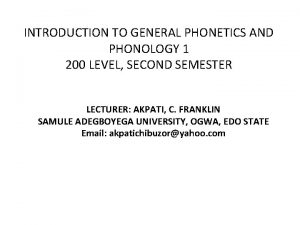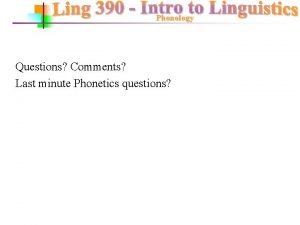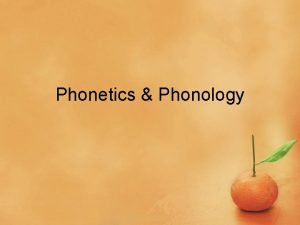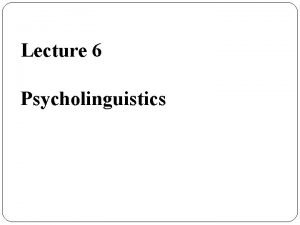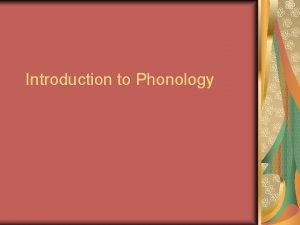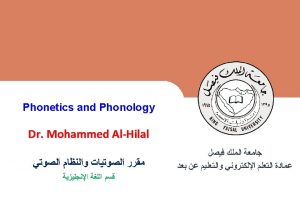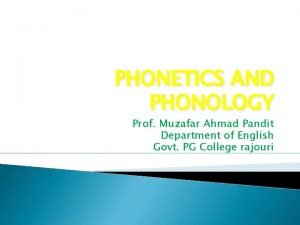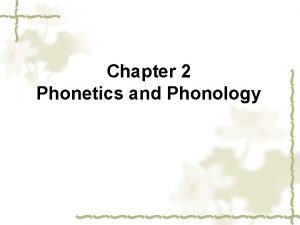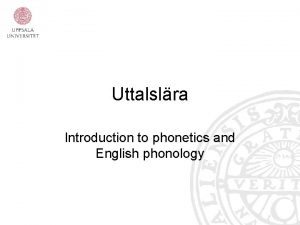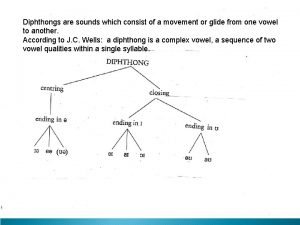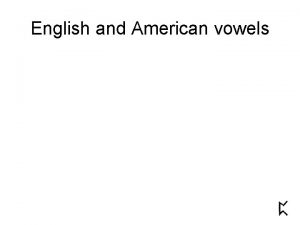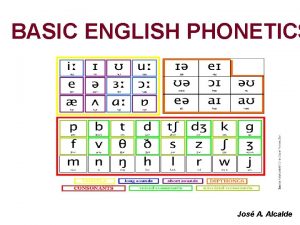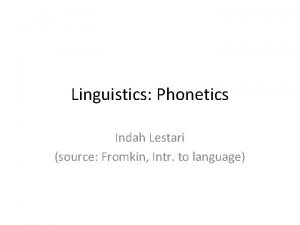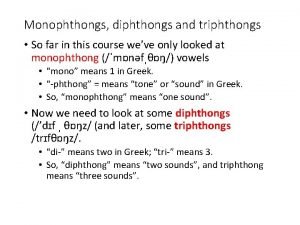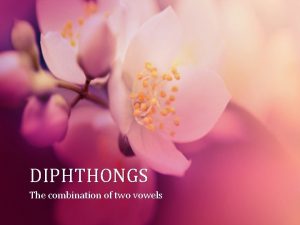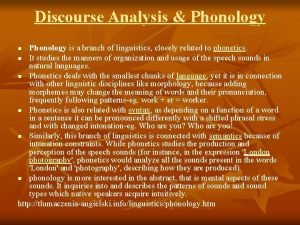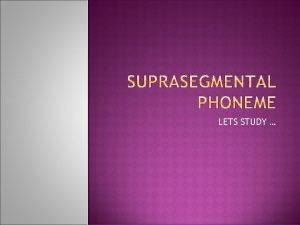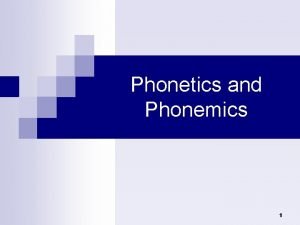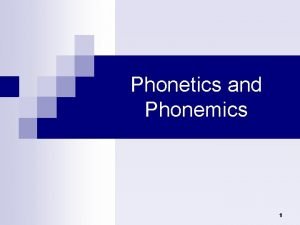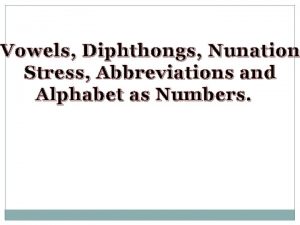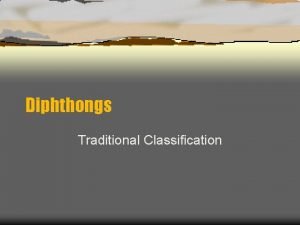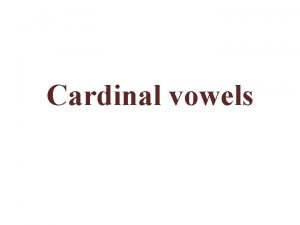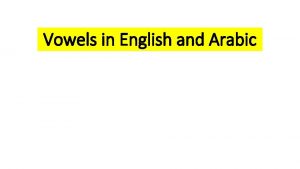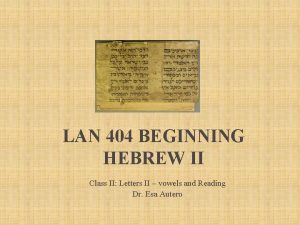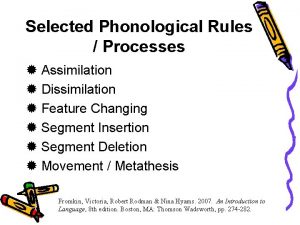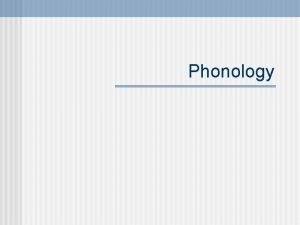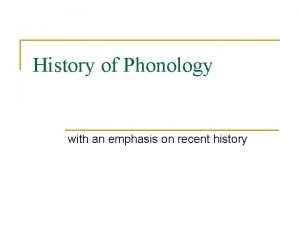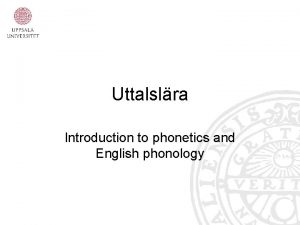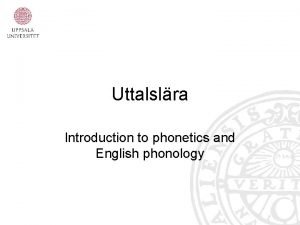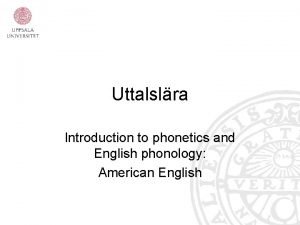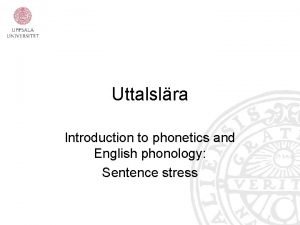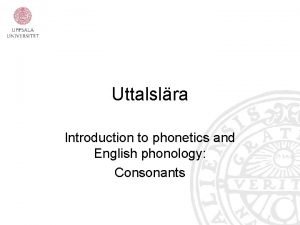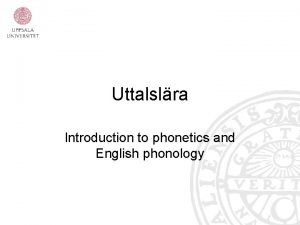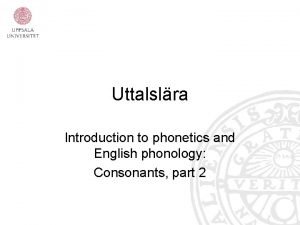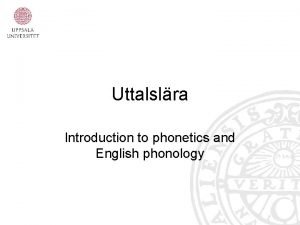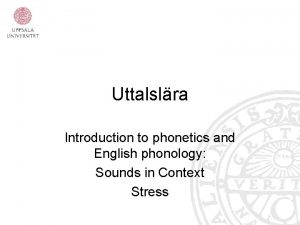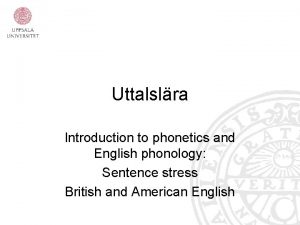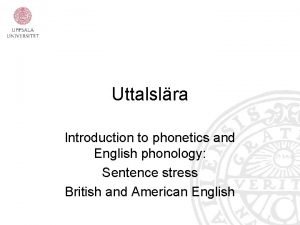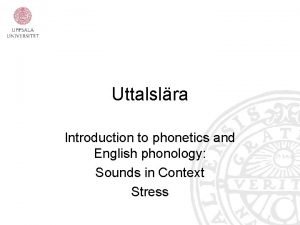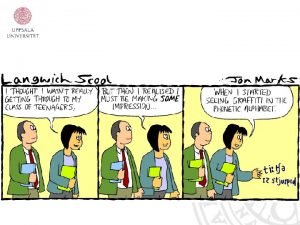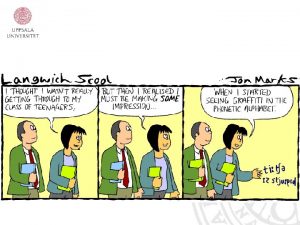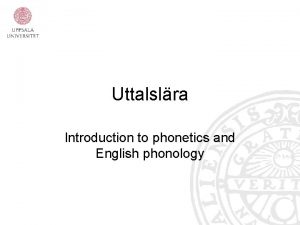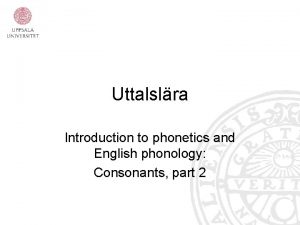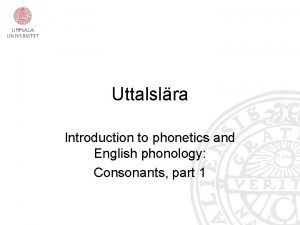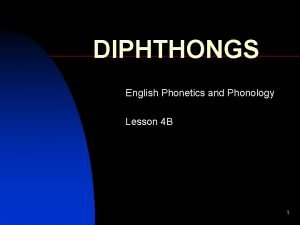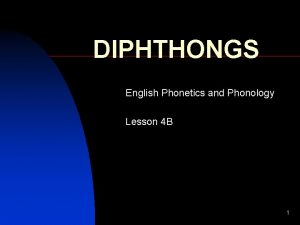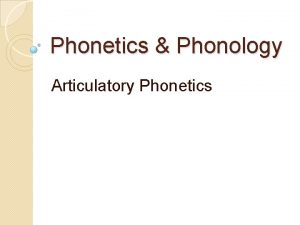Uttalslra Introduction to phonetics and English phonology Diphthongs




































- Slides: 36

Uttalslära Introduction to phonetics and English phonology

Diphthongs Also known as glides. Two sounds (di- = two, double) Two types of diphthongs: falling where the first sound is more pronounced than the second sound, and rising where the second sound is more pronounced. English has eight diphthongs, all of them falling.

/eı/ as in say Spellings: a, ai, ay, ei, ey Examples raven /ˈreıvən/ train /treın/ weigh /weı/

/aı/ as in iron Spellings: i, y, ie, ye Examples bite /baıt/ die /daı/ rye /raı/

/ɔı/ as in boy Spellings: oi, oy Examples joint /dʒɔınt/ toy /tɔı/

/aʊ/ as in scout Spellings: ou, ow Examples noun /naʊn/ howl /haʊl/ out /aʊt/

/əʊ||o(ʊ)/ as in boat Spellings: o, oa, oe, ou, ow Examples nose /nəʊz||noʊz/ boat /bəʊt||boʊt/ toe /təʊ||toʊ/ tow /təʊ||toʊ/

/ıə/ as in dear Spellings: e, ea, ee, ie (all before r) Examples here /hıə(r)/ beard /bıə(r)d/ beer /bıə(r)/ pierce /pıə(r)s/

/eə/ as in hair Spellings: a, ae, ai, ey (all before r) Examples hair /heə(r)/ bare /beə(r)/ heir /eə(r)/ bear /beə(r)/

/ʊə/ as in poor (uncommon) Spellings: oo, u (both before r) NB! Only in RP. Is becoming replaced by /ɔː/ or /uː/ Examples jury /dʒʊərı || dʒuːrı/ poor /pʊə || pɔːr/

Consonants Produced by obstructing the airstream through the oral cavity. Can be voiced or voiceless

Voicing When a speech sound is produced with the help of the vocal cords, we say that the sound is voiced. When the vocal cords are not vibrating, the sound is voiceless (or unvoiced). Vowels are always voiced. Consonants are either voiced or voiceless.

Mute consonants Some words are spelled with one or more consonants that are not pronounced. thumb Christmas sigh /θʌm/ /ˈkrısməs/ /saı/

Two ways of describing consonants • The place in the mouth (for instance dentals – produced with the tongue touching the teeth) • The manner of articulation (for instance fricatives – produced by creating friction in the mouth)

Types of consonants in English • Plosives (stops) • Fricatives • Nasals • Affricates • Semi-vowels

The consonants of English 1 Plosives Fricatives Nasals Voiceless /p/ pet /k/ kite /t/ take /f/ fan /s/ so /ʃ/ shore /θ/ thin /h/ hat Voiced /b/ bag /g/ bag /d/ dog /v/ van /z/ zoo /ʒ/ vision /ð/ then /m/ men /n/ men /ŋ/ sing

The consonants of English 2 Affricates Voiceless /tʃ/ church Voiced /dʒ/ judge Semi-vowels /w/ well /j/ yes Lateral /l/ long Frictionless continuant /r/ rose

Plosives Also known as stops. The flow of air is completely blocked and then released all at once. English has six plosives; three voiced and three voiceless.

The English plosives Voiceless /p/ pin /t/ tin /k/ coat Voiced /b/ bin /d/ din /g/ goat

/p/ as in pin, /b/ as in bin “p” is mute in words with pn- and pspsalm /sɑːm/ pneumonia /njuˈməʊnıə/ “b” is mute in most words with -mb thumb /θʌm/, climb /klaım/ “b” is also mute in subtle /sʌtl/, doubt /daʊt/

/t/ as in tin, /d/ as in din Pronunciation: the tip of the tongue not touching the teeth “t” is mute in some words with -stlisten /ˈlısən/ castle /ˈkɑːs(ə)l || ˈkæs(ə)l/ Christmas /ˈkrısməs/ “d” is mute in a few words handkerchief /ˈhæŋkərtʃıf/ Wednesday /ˈwenzdeı/

/k/ as in coat Spellings: k, c, qu king /ˈkıŋ/ cane /keın/ liquid /ˈlıkwıd/ quay /kiː/ “k” is mute in words with knknight /naıt/ knit /nıt/

/g/ as in goat “g” is mute in words with gn- or -gn: gnat /næt/ reign /reın/ sign /saın/ There also other pronunciations of the letter “g”.

Fricatives The flow of air is partially blocked, to create friction. English has nine fricatives; four voiced and five voiceless.

The English fricatives Voiceless /f/ fan /s/ so /ʃ/ shore /θ/ thin /h/ hat Voiced /v/ van /z/ zoo /ʒ/ vision /ð/ then

/f/ as in fan, /v/ as in van /f/ Spelling: f, ph, gh Phil enough /fıl/ /ıˈnʌf/ /v/ Spelling: v Important contrast between /v/ and /w/ ! Note: of /ɒv||ʌv/

/s/ as in so Spellings: c, ss, sc, s-, sometimes -s cease advice miss sing /siːs/ /ədˈvaıs/ /mıs/ /sıŋ/

/z/ as in zoo Spellings: z, sometimes s seize keys has is /siːz/ /kiːz/ /hæz/ /iz/

/s/ versus /z/ decision hiss sink niece /dıˈsıʒən/ /hıs/ /sıŋk/ /niːs/ position his zinc knees /pəˈzıʃən/ /hız/ /zıŋk/ /niːz/ Slightly longer vowel sound before a voiced consonant!

/ʃ/ as in shore Spellings: sh, -ti-, -ci-, -si-, sometimes ch machine Asia ancient Charlotte /məˈʃiːn/ /ˈeıʃə/ /ˈeınʃənt/ /ˈʃɑː(r)lət/

/ʒ/ as in pleasure Spellings: -su-, -sion (preceded by a vowel), -ge treasure television prestige /ˈtreʒə/ /ˈteləvıʒən/ /prəˈstiːʒ/

/θ/ as in thin Spelling: th faith Thursday thin cathedral /feıθ/ /ˈθɜː(r)zdeı/ /θın/ /kəˈθiːdrəl/

/ð/ as in then Spelling: th Important to know when to use /ð/ and when to use /θ/! then brother breathe /ðen/ /ˈbrʌðə(r)/ /briːð/ (but: breath /breθ/ )

Pronunciations of th /θ/ in most words beginning with thin words ending in -th except verbs /ð/ in some words beginning with th- : then, thus, the, that, though /t/ in Mathilda, Thailand, Thomas

/h/ as in hat “h” is mute in some words vehicle shepherd Birmingham heir /viːıkl/ /ˈʃepəd/ /ˈbɜː(r)mıŋəm/ /eə(r)/

Thank you for listening!
 Introduction to general phonetics and phonology
Introduction to general phonetics and phonology Complementary distribution examples
Complementary distribution examples Difference between phonetics and phonology
Difference between phonetics and phonology Questions about phonology
Questions about phonology Phonetics and phonology
Phonetics and phonology Rowe concise introduction to linguistics download
Rowe concise introduction to linguistics download Working memory
Working memory Phonetics vs phonology
Phonetics vs phonology Phonemes and symbols
Phonemes and symbols Secondary vowels
Secondary vowels Phonetics and phonology
Phonetics and phonology Phonetics
Phonetics S phonetic alphabet
S phonetic alphabet English diphthongs
English diphthongs Centring diphthongs
Centring diphthongs Language
Language American english phonology
American english phonology What are the 8 diphthongs
What are the 8 diphthongs Phonetic is
Phonetic is Monophthongs diphthongs and triphthongs
Monophthongs diphthongs and triphthongs A combination of two vowel sounds
A combination of two vowel sounds Discourse analysis and phonology
Discourse analysis and phonology Peaking intonation
Peaking intonation Definition of consonants
Definition of consonants Phonetics and phonemics
Phonetics and phonemics Diphthongs in arabic
Diphthongs in arabic Classification of diphthongs
Classification of diphthongs Diphthongs are also called
Diphthongs are also called Cardinal vowels
Cardinal vowels Diphthongs
Diphthongs Diphthongs in arabic
Diphthongs in arabic Propretonic
Propretonic Dissimilation meaning
Dissimilation meaning Contrastive distribution
Contrastive distribution Phonological processes
Phonological processes Non segmental phonology
Non segmental phonology Autosegmental phonology
Autosegmental phonology
